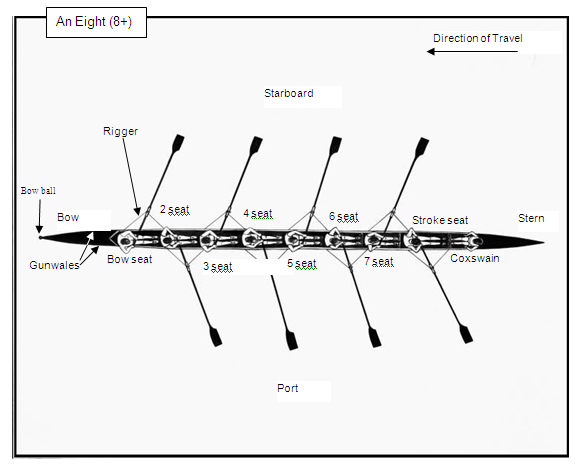I started rowing when I was 44. I am 54 now and still ‘perfecting’ my technique, which, by the way, is far from perfect. I like to think that this has nothing to do with my sporting abilities. Having earned my 2nd Dan in Karate at the ripe old age of 44 and having mastered the Black belt Katas that involve more than 50 intricate movements flowing into each other, I was pretty confident I could handle something as simple as rowing.
10 years on, and with the notion of ‘gently down the stream’ a distant memory, I decided, to explore the sport in greater depth and understand what the sport truly meant to me.
10 years on, and with the notion of ‘gently down the stream’ a distant memory, I decided, to explore the sport in greater depth and understand what the sport truly meant to me.
In rowing, the 1st position on the boat is occupied by the person who sits in the last seat (bow) on the boat, the way we traditionally know it.
The stroke, who sits at the head of the boat, is the last person on the boat, given the direction in which the boat moves.
Here is a sport that puts the first person last. Here is the only sport that moves backward in order to move forward… where the eye is not on the finish line… where the accent is on co-ordination and team work and doing the best you can.
Add to this the fact that rowing is one of the few sports that involve 3 elements: man, machine, water and it could explain why, something that is so seemingly simple is, in reality, unfathomably deep. (Or why, ten years on, I am still “perfecting” my technique).
This is perhaps also the reason why the sport offers such a unique perspective, understanding and ‘vivid metaphor’ of life in its various hues and colours.
Hard through the water, slow up the slide
A good coach will have this slogan running through your head when you begin to row.
“Push your oar hard through the water. When you have finished your stroke, move up the slide slowly till it is time for your next stroke.”
Put your effort where and when it matters most. Catch your breath, when you need to. Don’t rush things. Give it all you‘ve got, when you have to.
Better Balance – against the wind
Like cycling against the wind, rowing can be tough with the wind not blowing your way. But, the push of the wind below the blade gives it a bit of a lift that can help you balance the blades a little better.
A little adversity can be good for you.“Sweet are the uses of adversity, which like a toad, ugly and venomous, Wears yet a precious jewel in his head”.
Bell sound
When you have dropped your oar at entry, just right, and the perfectly squared blade begins to thrust through the water, you here a bell sound, telling you all is well.
If ever there is a sound of perfection, it is the bell sound of the blade in the water.Imagine, just how different life would be, if every time you did something just right, you were rewarded with a ‘bell sound’.Truth is, when you have done something well, in your heart; you can hear the bell ring.
We must accept that not every stroke can be a perfect stroke. But that shouldn’t stop us from trying.
Loose grip – “Play the Piano on your oars as you row”
In rowing, the tendency to grip your oars tight, especially when you are putting in more effort (rowing medium or hard with a quicker rating) can produce disastrous results. Often resulting in the Oar not dropping into the water cleanly and affecting your ‘Catch’.
The tendency to grip the oar tight is most natural, as in most areas when a greater physical effort is required a firmer grip is instinctive. Not so in rowing. A light grip is indicative of just how relaxed you are. And the more relaxed you are the better you will row.
Remember the saying,” Hang loose, mother goose”, or “Stay cool”? This is the equivalent of the “Loose grip” in rowing. And just as you need to stay cool, in a tense situation, so also you need to lighten your grip on the Oars. Here is a real life analogy that easily demonstrates to you, the positive effects of staying cool in a pressure situation.
(R. Krishnamohan)
The stroke, who sits at the head of the boat, is the last person on the boat, given the direction in which the boat moves.
Here is a sport that puts the first person last. Here is the only sport that moves backward in order to move forward… where the eye is not on the finish line… where the accent is on co-ordination and team work and doing the best you can.
Add to this the fact that rowing is one of the few sports that involve 3 elements: man, machine, water and it could explain why, something that is so seemingly simple is, in reality, unfathomably deep. (Or why, ten years on, I am still “perfecting” my technique).
This is perhaps also the reason why the sport offers such a unique perspective, understanding and ‘vivid metaphor’ of life in its various hues and colours.
Hard through the water, slow up the slide
A good coach will have this slogan running through your head when you begin to row.
“Push your oar hard through the water. When you have finished your stroke, move up the slide slowly till it is time for your next stroke.”
Put your effort where and when it matters most. Catch your breath, when you need to. Don’t rush things. Give it all you‘ve got, when you have to.
Better Balance – against the wind
Like cycling against the wind, rowing can be tough with the wind not blowing your way. But, the push of the wind below the blade gives it a bit of a lift that can help you balance the blades a little better.
A little adversity can be good for you.“Sweet are the uses of adversity, which like a toad, ugly and venomous, Wears yet a precious jewel in his head”.
Bell sound
When you have dropped your oar at entry, just right, and the perfectly squared blade begins to thrust through the water, you here a bell sound, telling you all is well.
If ever there is a sound of perfection, it is the bell sound of the blade in the water.Imagine, just how different life would be, if every time you did something just right, you were rewarded with a ‘bell sound’.Truth is, when you have done something well, in your heart; you can hear the bell ring.
We must accept that not every stroke can be a perfect stroke. But that shouldn’t stop us from trying.
Loose grip – “Play the Piano on your oars as you row”
In rowing, the tendency to grip your oars tight, especially when you are putting in more effort (rowing medium or hard with a quicker rating) can produce disastrous results. Often resulting in the Oar not dropping into the water cleanly and affecting your ‘Catch’.
The tendency to grip the oar tight is most natural, as in most areas when a greater physical effort is required a firmer grip is instinctive. Not so in rowing. A light grip is indicative of just how relaxed you are. And the more relaxed you are the better you will row.
Remember the saying,” Hang loose, mother goose”, or “Stay cool”? This is the equivalent of the “Loose grip” in rowing. And just as you need to stay cool, in a tense situation, so also you need to lighten your grip on the Oars. Here is a real life analogy that easily demonstrates to you, the positive effects of staying cool in a pressure situation.
(R. Krishnamohan)


